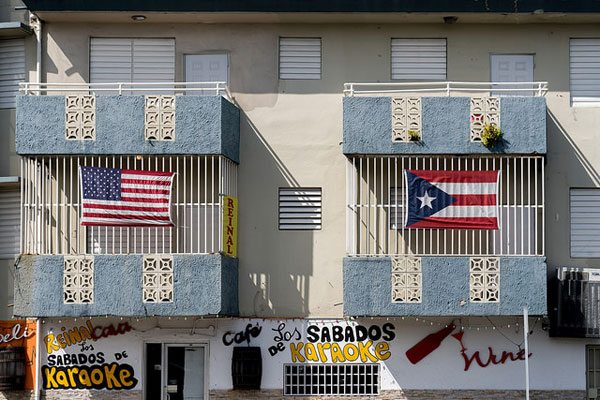
May 1, 2018; Washington Post, NBC News, and New York Times
“Thousands of Puerto Ricans marched Tuesday to protest pension cuts, school closures, and slow hurricane recovery efforts as anger grows across the US territory over looming austerity measures,” writes Associated Press reporter Danica Coto in the Washington Post. The march, held on International Labor Day (a holiday that, although not widely celebrated in the US, originated here) “attracted teachers, retirees and unionized workers from both the private and public sectors, as well as the mayor of the capital of San Juan, Carmen Yulín Cruz,” notes Coto.
Considerable press attention has focused on the clashes that occurred during the march between protestors and police. According to Puerto Rican government officials, 13 people were arrested and 15 police officers were injured, either by projectiles thrown by protestors or their own tear gas. NBC News reports that, “According to the ACLU chapter in Puerto Rico, police officers disproportionately used violence against demonstrators, reporters, and legal observers, followed by warrantless arrests of protesters in their homes and university dorms.”
Of course, the main goal of the marchers was to call attention to the pain caused by both economic austerity and a slow recovery from Hurricane Maria. In Puerto Rico today, 30,000 residents still remain without power. Speaking before the march, Mayor Cruz called attention to her compatriots’ plight: “There are retirees here who are going to lose their pensions, there are students, there are employees who are going to see money for their medical plans taken away.”
Sign up for our free newsletters
Subscribe to NPQ's newsletters to have our top stories delivered directly to your inbox.
By signing up, you agree to our privacy policy and terms of use, and to receive messages from NPQ and our partners.
Perhaps the biggest impact of austerity has been on Puerto Rico’s public schools, 179 of which have already closed, with another 280 of the remaining 1,100 schools slated to shut their doors. Public pensions also face a 10-percent cut, public university fees have doubled, and reduced paid and sick days are also part of the benefit reduction package. Aid has been slow to arrive, too. For example, a New York Times article reports that total post-disaster assistance to Puerto Rico’s universities totals a paltry $8.9 million.
All of this has been overseen by a highly unpopular congressionally appointed fiscal oversight board, widely viewed as favoring corporate and bondholder interests over Puerto Rico’s own. Last month, Puerto Rico’s Senate voted 25–0 (with five abstaining or absent) to cease funding the board’s operations. Puerto Rico Senate President Thomas Rivera Schatz denounced the board’s executive director Natalie Jaresco, who receives a $650,000 salary, for living “at the expense of the people of Puerto Rico while trying to eliminate the Christmas bonus to workers of private companies and the government and is also trying to reduce your working hours or eliminate your vacation. And who is attacking the medical services, education, and housing of the Puerto Rican people.”
Speaking about the budget cuts with NBC News, Edwin Meléndez, who directs Hunter College’s Center for Puerto Rican Studies in New York City, said that it is true that, “in many instances, the austerity is disproportionately affecting the most vulnerable populations—it could be a more equitable reform that would be more balanced in terms of cutting services.”
As we have covered in NPQ, in the post-Hurricane Maria context, issues of sovereignty and equity are paramount. More NPQ articles about recovery efforts in Puerto Rico can be found here.—Steve Dubb












